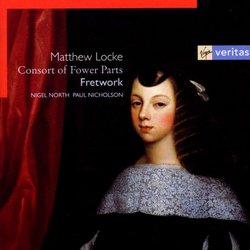| All Artists: Nigel North, Paul Nicholson Title: Locke: Consort of Fower Parts Members Wishing: 1 Total Copies: 0 Label: EMI Import Release Date: 12/23/2002 Album Type: Import Genre: Classical Styles: Chamber Music, Historical Periods, Baroque (c.1600-1750), Classical (c.1770-1830) Number of Discs: 1 SwapaCD Credits: 1 UPC: 724354514227 |
Search - Nigel North, Paul Nicholson :: Locke: Consort of Fower Parts
 | Nigel North, Paul Nicholson Locke: Consort of Fower Parts Genre: Classical
|
Larger Image |
CD Details |
CD ReviewsThe Birth of the String Quartet Giordano Bruno | Wherever I am, I am. | 11/28/2007 (5 out of 5 stars) "Joseph Haydn is widely regarded as the progenitor of the string quartet as a standard genre and ensemble, as well as the first composer to develop the "inner" voices (2nd violin and viola) as equal independent partners in the music. Mozart is appropriately adulated for bringing new levels of seriousness and complexity to the quartet form. A hundred years and more earlier, however, English composers now largely forgotten were composing music of the greatest subtlety and grace for the string quartet. Not the 16-string quartet of two violins, viola, and cello, mind you! Rather for the 24-string quartet of treble, tenor and two bass violas da gamba.
Amongst the finest of the gamba composers was Matthew Locke, still somewhat remembered in England for his anthems and voluntaries. This CD of Locke's Consort in Fower (4) Parts is one of the glories of pre-Civil War English music. Heartfelt, stately, melancholy, Locke's consort suites are the musical equivalent of John Donne's Meditations or Shakespeare's sonnets. If your experience of Renaissance music has been limited to Susato branles and a few lute songs, you'll be astonished by the sophistication of Locke's harmony and counterpoint. There are also moments of flare and bravura, but the general mood of the music is more philosophical than lusty. FRETWORK owns this gamba repertoire by virtue of incredible ensemble-playing matched by only the finest modern string quartets. There are at least three recordings of the Consort of Fower Parts, including one by Jordi Savall with Hesperion XX. Jordi is the modern world's foremost virtuoso of the viola da gamba - you may have heard him playing in the movie Tous Les Matins du Monde - but the FRETWORK performance beats Hesperion XX's in expressiveness and beauty of timbre." |

 Track Listings (36) - Disc #1
Track Listings (36) - Disc #1